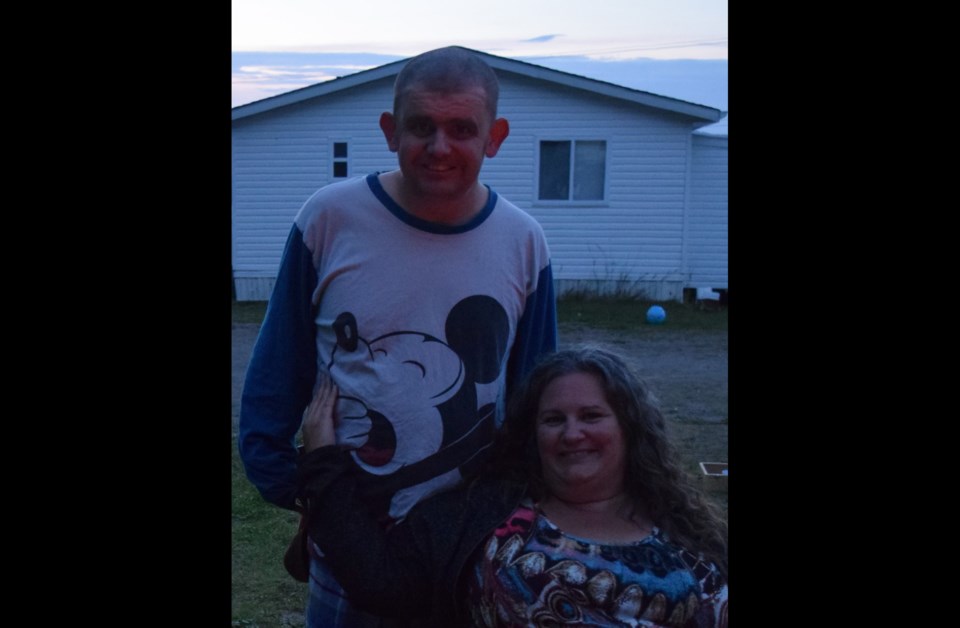The mother of a local man, who was hit by a car while crossing the street, says she doesn’t wish her experience on any parent.
Marnie Phair is unvaccinated and was not able to visit her 30-year-old son Matthew when he was admitted to the intensive care unit at the University Hospital of Northern B.C. (UHNBC).
Matthew was on his way home from his Special Olympics swim practice on Feb. 9 when he was hit in a crosswalk on 15th Avenue and Jarvis Street shortly before 6 p.m.
Phair says not being able to visit her son was especially concerning for her because he is developmentally delayed, now suffering from a major concussion, and wasn’t able to understand why his mother couldn’t be there for him.
“I had sent an email to the hospital and contacted them as best as I could and asked if there was any chance that because I am unvaccinated, if they could make a way for me to come in and see him,” said Phair.
“I was really upfront that I'm not vaccinated but I would be willing to take a PCR test or do whatever was needed. I would have put on full hazmat if that's what was required just to go in and to be able to see my son and to just bring in the comfort that his mom loves him.”
Phair said when her son was moved from ICU and into another unit, she was told that because she was not vaccinated there was absolutely no provision that could be made for her to see him as he was in a stable condition at that point.
She says that her son did have a caregiver that was coming to help him and that was one of the reasons why she wasn’t allowed to visit him, but mostly because she was not vaccinated.
“It was probably one of the worst experiences I've ever had in my life,” said Phair, adding that her son received excellent care from hospital staff, but the seperation was devastating for both.
“Just to not have that assurance that his mom isn't there because she doesn't love him. His mom isn't there because she's not allowed to be and that's a hard one because you can't explain that to someone that can't understand.”
Phair explained she chose not to get the COVID-19 vaccine because she is a person of faith and had a conviction in her heart that getting vaccinated wasn’t something she felt called to do.
“Everybody gets to make choices in life, and the choices they make are based on their own beliefs and their own values and I’m making mine based on my own beliefs and my own values,” said Phair.
She says her son has now been discharged from the hospital and is back in his share home but he’s suffering from a broken clavicle and a severe concussion.
Phair says he’s not able to do a lot and has a long road ahead of him in terms of recovery.
“I understand my son’s situation was extremely unusual – but there needs to be a means to enable family to be able to visit their loved ones when there is a critical incident such as this. I understand you want to have it for the better good of all around, but there can be some precautions that will be taken, so you can ensure the safety of all,” said Phair.
“No parent ever wants to get a phone call to say that their child has been hurt and you spent an entire night not knowing because you don't get the phone call from the hospital or have that information from the doctor and wondering the next day if you child will be alive or not.”
A spokesperson for Northern Health said it was unable to comment on specific cases, but that UHNBC acute care sites are following the BC Ministry of Health Guidelines.
“Visitation restrictions aim to protect patients, health-care workers, and the public in acute care facilities from COVID-19, while continuing to ensure that patients are provided with essential supports to ensure safe and supportive care,” states the guidelines.
The ministry says that in recognition of the added layer of protection provided by the COVID-19 vaccines and given the vulnerability of patients in acute care even when fully vaccinated themselves, individuals visiting acute care facilities must be fully vaccinated against COVID-19.
Visitors who do not demonstrate that they are fully vaccinated will not be able to enter a facility, including passing through the facility to access an outdoor space.
While there are guidelines for specific care settings where vaccination requirements do not apply, such as when death is anticipated as imminent, the guidelines also note that all visitation in the emergency department and the ICU is at the discretion of the clinical team because conditions in these settings can change rapidly.
The ministry says that visitors and patients can also request a review of any decisions made related to visitor status through the health authority’s Patient Care Quality Office.



